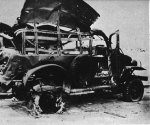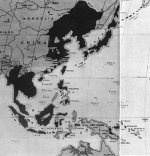Sir Robert Menzies
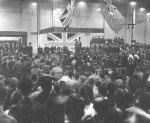 January to May: Prime Minister Menzies visits wartime England to put Australia's claims for help in the Pacific. He travels via Penang, Bangkok, Rangoon, Calcutta and Cairo, and visits RAN vessels in Alexandria harbour. Menzies inspects Bardia, Tobruk and Benghazi from the air, and visits Australian troops who played a major part in the North African victories.
January to May: Prime Minister Menzies visits wartime England to put Australia's claims for help in the Pacific. He travels via Penang, Bangkok, Rangoon, Calcutta and Cairo, and visits RAN vessels in Alexandria harbour. Menzies inspects Bardia, Tobruk and Benghazi from the air, and visits Australian troops who played a major part in the North African victories.
Menzies flies on to England via Khartoum, Lagos and Lisbon, to attend Churchill's War Cabinet in London for ten weeks. He holds talks with ministers, civil servants and English leaders.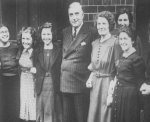 On the return trip he visits the USA to deliver speeches in New York, Washington and Chicago.
On the return trip he visits the USA to deliver speeches in New York, Washington and Chicago.
"Like you Americans, we Australians like to lead a life of our own ... but this war is not about the politics of Europe but the politics of the human race."
Mr Menzies makes this remark to a circle of newspapermen on his arrival in New York.
PRIME MINISTER MENZIES SPEAKING TO THE PRESS ON HIS RETURN FROM WARTIME ENGLAND:
"I come back to Australia with just one sick feeling in my heart and that is that I must now come back to my own country and play politics.
I think that it's a diabolical thing that anybody should have to come back and play politics - however cleanly, however friendly - at a time like this."
- A diary kept by Robert Menzies of his experiences during the trip was published as Dark and Hurrying Days. It was a grim time when British cities were enduring heavy bombing and German invasion seemed imminent.
National Library: "Dark and Hurrying Days; Menzies' 1941", ed A W Martin and P Hardy. - August: Dissension in the United Australia Party-Country Party coalition leads to Menzies' resignation as Prime Minister on August 28. Menzies retains his position in an unchanged Ministry, but loses the UAP leadership to W M Hughes. Despite the coalition instability, Menzies government has prepared the nation for war.

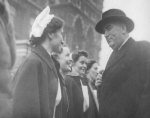
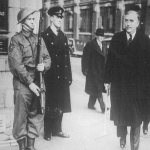
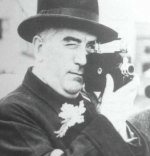
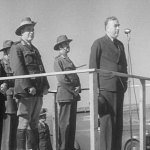
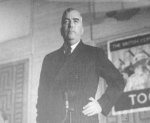
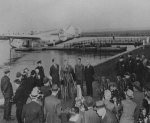

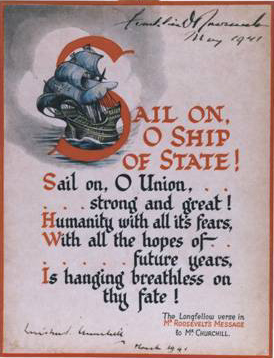 "Roosevelt ... agreed that we all ought to tell Japan where she gets off, but ... stops short of actually instructing the USA Ambassador to do so. I am left in no doubt (without words) that America will not stand by & see Australia attacked. ... R. is a little jealous of Winston's place in the centre of the picture. I tell him they should have a meeting."
"Roosevelt ... agreed that we all ought to tell Japan where she gets off, but ... stops short of actually instructing the USA Ambassador to do so. I am left in no doubt (without words) that America will not stand by & see Australia attacked. ... R. is a little jealous of Winston's place in the centre of the picture. I tell him they should have a meeting." 